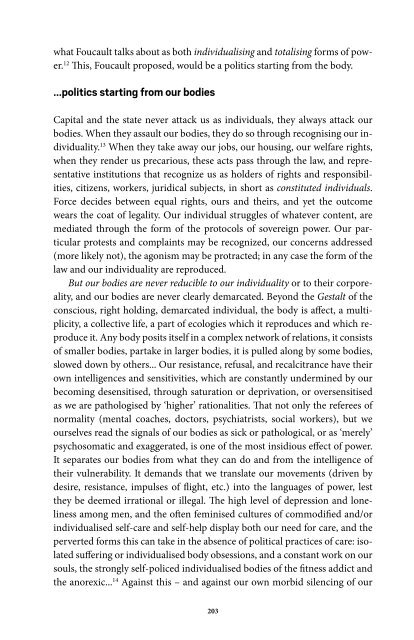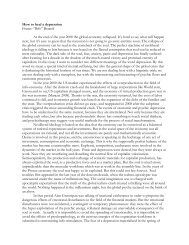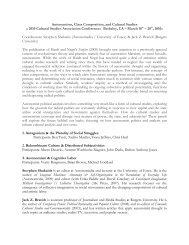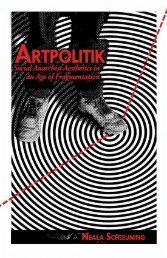- Page 3 and 4:
nanopoliticshandbookthe nanopolitic
- Page 5 and 6:
IndexpageIntroduction11collective p
- Page 7:
Towards a careful listeningexercise
- Page 10 and 11:
1/2/3/A map of this bookThis book h
- Page 12 and 13:
From bodies to booksTrying to rende
- Page 15:
collectiveprocesses
- Page 19 and 20:
So a second level of our work conce
- Page 21 and 22:
mines our lives, work and politics
- Page 23 and 24:
through other experiences? And how
- Page 25 and 26:
care (not just individual but colle
- Page 27 and 28:
mal and natural that make life ‘e
- Page 30 and 31:
areas are erased by gated shopping
- Page 32 and 33:
Work, professionalization and the p
- Page 34 and 35:
on guidelines and protocols: whethe
- Page 36 and 37:
Endnotes1. This text was collective
- Page 38 and 39:
that we have been wandering these l
- Page 40:
does the common narrative of a grou
- Page 43 and 44:
also audiovisual recordings. We wou
- Page 45 and 46:
How is it that the awareness and lo
- Page 47 and 48:
translate into product. As an a pri
- Page 49 and 50:
and palpable to us on a daily basis
- Page 51 and 52:
en its double meaning in Spanish.
- Page 53 and 54:
Looking again at Bifo’s text, it
- Page 55 and 56:
Micropolitics— David Vercauteren
- Page 57 and 58:
to pursue here, which is that of gr
- Page 59 and 60:
So what are the stakes concerning t
- Page 61 and 62:
In order for a power relation to be
- Page 63 and 64:
7. Félix Guattari (1986), Les ann
- Page 65 and 66:
of our terrain? What do we need (co
- Page 67 and 68:
noyed, fatigue...) in 2-3 words. Th
- Page 69:
methodsandmethodologies
- Page 74 and 75:
activities? Are the quests of a sha
- Page 78 and 79:
present, and the relationship is mo
- Page 80 and 81:
fundamental question of the worksho
- Page 82 and 83:
another, and this confusion also al
- Page 84 and 85:
* * *The production of subjectivity
- Page 86 and 87:
Sculpting and modelling seriesAs a
- Page 88 and 89:
verbalised - of our experiences and
- Page 90 and 91:
exerciseThe machine of rhythmsIn Ap
- Page 93 and 94:
Somaan anarchist experiment— Jorg
- Page 95 and 96:
Because they want to make omelettes
- Page 97 and 98:
Soma games ask a group to interact
- Page 99 and 100:
scientifically proven fact today, m
- Page 101 and 102:
Endnotes1. Roberto Freire (1990) Am
- Page 103:
At the end, the group plays as a wh
- Page 106:
architects, planners, councillors,
- Page 109 and 110:
There have been so many street trai
- Page 111 and 112:
exerciseSmiling at strangers,smelli
- Page 113 and 114:
Walk around as if you own the stree
- Page 115 and 116:
Fling your flip flop from your foot
- Page 117 and 118:
Bodily semblances,temporary dwellin
- Page 119 and 120:
in the history of dance, theatre an
- Page 121 and 122:
in the leitmotiv of texture and wea
- Page 123 and 124:
field of metabolic processes, which
- Page 126 and 127:
eathing, as in the previous exercis
- Page 128 and 129:
common milieu, a transitional space
- Page 130 and 131:
Perhaps it’s the notion itself of
- Page 132 and 133:
If the imaginary impregnates sensat
- Page 134 and 135:
While we were holding it togetherBu
- Page 136 and 137:
extend Foucault’s aesthetic of ex
- Page 138 and 139:
16. Linda Hartley, op. cit., pp. 34
- Page 141:
experimentsandexperiences
- Page 144 and 145:
Need to find ways of holding that a
- Page 146 and 147:
messy, collective voices in movemen
- Page 148 and 149:
kids that go back to their families
- Page 150 and 151: We met for our first nanopolitics d
- Page 152 and 153: process rushy events and feelings b
- Page 154 and 155: complete freedom because everybody
- Page 156 and 157: elated fears. ‘This works well if
- Page 158 and 159: We have been waiting for Carla to c
- Page 160 and 161: nano of the relationship between ou
- Page 162 and 163: malleable understandings of geograp
- Page 164 and 165: Reflections before being trainedTo
- Page 166 and 167: The controlled body is constantly c
- Page 168 and 169: the purpose of doing this i know, b
- Page 170 and 171: in single-file: Drawing out ideas f
- Page 172 and 173: production pressure. i am all for p
- Page 174 and 175: All: How did the group experience p
- Page 176 and 177: insurmountable barriers all around
- Page 178 and 179: exerciseBody surfaces and boundarie
- Page 181 and 182: A politics ofnetwork-families?Preca
- Page 183 and 184: ways of relating that run counter t
- Page 185 and 186: How to act in this world, how to ri
- Page 187 and 188: The importance of the debt economy
- Page 189 and 190: limitations: to give up the silly p
- Page 191 and 192: a family, or a somehow older networ
- Page 193 and 194: 10. Interview with Nelly, London, A
- Page 195: together. Draw a ‘conviviality’
- Page 198 and 199: are less precarious than us. Capita
- Page 202 and 203: odies - we must develop our common
- Page 204: of this as the general condition wh
- Page 207 and 208: the individual as homo economicus,
- Page 209 and 210: esistances of individual bodies des
- Page 211 and 212: happens by way of a new externalisa
- Page 213 and 214: If we look for a slogan that can de
- Page 215 and 216: Endnotes1. Precarias a la Deriva.
- Page 217 and 218: and the Permanence of Primitive Acc
- Page 219 and 220: exerciseAn exercise indeproletarian
- Page 221 and 222: No time for the sad passions— Ami
- Page 223 and 224: men and things seem set in sparklin
- Page 225 and 226: that radicality (the radicals playi
- Page 227 and 228: merely reflect action received from
- Page 229 and 230: to capture value, or the autonomy o
- Page 231 and 232: Endnotes1. Francois Dosse (2010), G
- Page 233 and 234: Towards a careful listening— Anja
- Page 235 and 236: privilege that underlie our speech.
- Page 237 and 238: consensus based to saturation-based
- Page 239 and 240: easy reception of linguistic conten
- Page 241 and 242: It is apparent that the refusal to
- Page 243 and 244: materiality and characteristics, th
- Page 245 and 246: tralian.com.au/national-affairs/mea
- Page 247: ecologiesandmetabolisms
- Page 250 and 251:
Water it a bit. 3Water regularly, d
- Page 253:
Voku Pocu:making a people’s kitch
- Page 257 and 258:
People’s kitchens have a strong l
- Page 259 and 260:
Polenta cakes for friends andcomrad
- Page 261:
mix it with maple syrup. This is pr
- Page 265 and 266:
ResourcesIn this section we collate
- Page 267 and 268:
Campo Grupal, Buenos Aires (AR). Un
- Page 269 and 270:
Caring labour, an extensive archive
- Page 271 and 272:
Silvia Gil (2011) ‘Vidas precaria
- Page 273 and 274:
Freaksexual blog, good on sexuality
- Page 275 and 276:
Biographies:the nanopolitics group
- Page 277 and 278:
he is researching the recent histor
- Page 279:
mara ferreri has worked and studied
- Page 282:
Minor CompositionsOther titles in t










